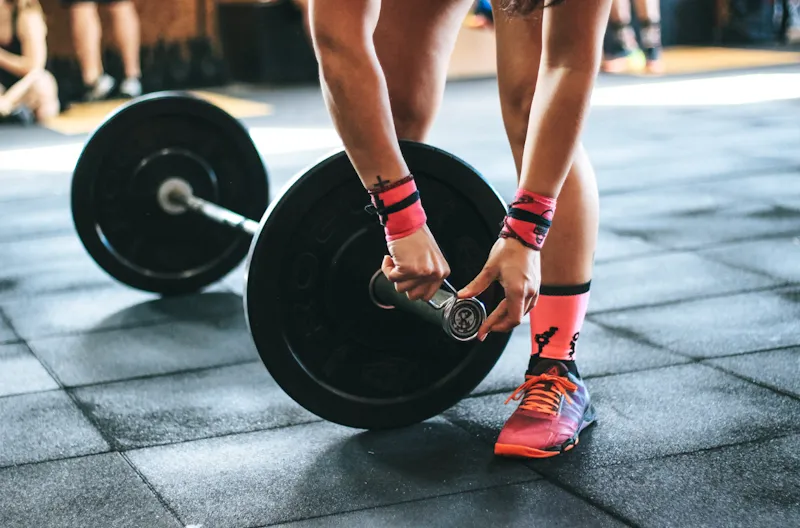Anorexia and Strength Sports: Understanding the Connection

What's In This Article
- Introduction
- The Intersection of Strength Sports and Anorexia
- Risk Factors for Anorexia Among Strength Athletes
- Identifying Symptoms of Anorexia in Athletes
- The Impact of Anorexia on Athletic Performance
- Strategies for Prevention and Early Intervention
- Treatment Options for Athletes with Anorexia
- Conclusion
- Frequently Asked Questions
Key Highlights
- Eating disorders can affect individuals involved in strength sports
- There are different types of eating disorders, including anorexia, bulimia, and muscle dysmorphia
- Coaches and trainers play a crucial role in the early detection and intervention of eating disorders among individuals
- Identifying symptoms of eating disorders in individuals is important for timely intervention
- Anorexia can have a significant impact on athletic performance and long-term career implications
- Prevention strategies and early intervention are crucial in creating a supportive environment for individuals
- Tailored treatment programs that integrate nutritional and psychological support are effective in the recovery of individuals with anorexia
- FAQs: Prevalence of anorexia among strength athletes and the possibility of recovery and return to high-level competition
Introduction
Anorexia Nervosa, commonly referred to as anorexia, is an eating disorder characterized by a distorted body image and an intense fear of gaining weight. It is a serious mental health condition that can have severe physical and psychological consequences. While is often associated with a desire to be thin, it can also occur in individuals involved in strength sports, where physical fitness and body image are highly valued. The significant revision of criteria for the next version of the Diagnostic and Statistical Manual of Mental Disorders (DSM) demonstrates how current criteria are totally inadequate in addressing the complexity of anorexia in different populations. The removal of amenorrhea as a criterion from DSM-5 highlights the increase in ‘manorexia’ and the need for a more comprehensive understanding of anorexia in strength sports.
Strength sports, such as weightlifting, powerlifting, and bodybuilding, require athletes to build and maintain muscle mass and strength. However, the pressure to achieve a certain body shape or weight for competition can contribute to the development of eating disorders in some athletes. This intersection raises important questions about the relationship between physical activity, body image, and mental health.
In this blog, we will explore the connection between anorexia and strength sports, including the risk factors, symptoms, and impact on athletic performance. We will also discuss strategies for prevention, early intervention, and treatment for athletes with anorexia. By understanding the unique challenges faced by athletes with anorexia and providing support and resources, we can help them overcome this dangerous eating disorder and maintain a healthy and balanced approach to their sport. Future studies are needed to fully assess the direct effect of eating disorders on sports performance.

The Intersection of Strength Sports and Anorexia
Strength sports, characterized by intense physical activity and a focus on physical fitness and strength, have become increasingly popular in recent years. Athletes in these sports undergo rigorous training programs to build muscle mass, improve performance, and achieve their goals. However, the intense physical demands and competitive nature of these sports can also increase the risk of developing eating disorders, including anorexia. To better understand this connection, a systematic review of the relevant peer-reviewed literature was performed, focusing on the effect of anorexia on physical fitness in the general population and on sports performance in athletes.
An eating disorder is a mental health condition characterized by abnormal eating habits and a distorted body image. It can affect individuals of all ages and genders and is particularly prevalent among athletes involved in competitive physical activities. In strength sports, where body image and physical appearance are often emphasized, female athletes may be more susceptible to developing anorexia.
Physical activity, including strength training, can improve mental health by reducing stress, boosting mood, and improving self-esteem. However, the pressure to excel in strength sports and achieve a specific body shape or weight can lead to body dissatisfaction and an unhealthy obsession with food and weight, which in turn can contribute to the development of anorexia.
Athletes with anorexia may engage in restrictive eating behaviors, excessive exercise, and other harmful practices to maintain a low body weight. They may have a distorted perception of their body image and fear weight gain, even when they are underweight. The pursuit of thinness and the drive to succeed in their sport can overshadow their physical and mental well-being, leading to serious health consequences.
It is important to recognize that anorexia is a complex mental health condition that requires specialized treatment and support. Coaches, trainers, and other fitness professionals who work with athletes in strength sports play a crucial role in early detection and intervention. By being knowledgeable about the signs and symptoms of anorexia and other disordered eating behaviours, they can provide the necessary support and resources to athletes who may be at risk or already struggling with these issues.
Defining Strength Sports and Their Appeal
Strength sports are athletic activities that focus on developing and showcasing physical strength and power. These sports include weightlifting, powerlifting, bodybuilding, and strongman competitions. Athletes in these sports undergo rigorous training regimens to build muscle mass, improve performance, and compete at high levels.
The appeal of strength sports lies in the challenge of pushing the limits of the human body and achieving personal goals. Athletes in these sports often set specific targets for strength, such as lifting a certain weight or achieving a particular body composition. Pursuing these goals requires dedication, discipline, and hard work.
Strength sports also provide a sense of community and camaraderie among athletes. Competitions and training sessions offer opportunities for athletes to connect, support each other, and share their passion for strength and fitness. The supportive environment of strength sports can be a source of motivation and inspiration for athletes to push themselves to new heights.
However, the emphasis on physical appearance and body composition in strength sports can also contribute to body image issues and the development of eating disorders. Athletes may feel pressure to achieve a certain body shape or weight to perform well or meet the aesthetic standards of their sport, putting them at a greater risk for developing anorexia and other eating disorders. This pressure, combined with the intense physical demands of training, can increase the risk of developing anorexia and other eating disorders.
Anorexia in the Context of Athletic Pursuit
Nervosa, commonly known as anorexia, is an eating disorder characterized by a fear of gaining weight and a distorted body image. It often manifests as restrictive eating behaviors, excessive exercise, and an obsession with thinness. While can affect individuals from all walks of life, athletes engaged in competitive sports, including strength sports, may be particularly susceptible.
Pursuing athletic excellence and the desire to achieve a specific body shape or weight can contribute to the development of eating problems in athletes. The pressure to perform at a high level, meet weight requirements, or adhere to aesthetic standards can lead athletes to engage in restrictive eating and excessive exercise, which can be detrimental to their physical and mental health.
Body dissatisfaction is also a common risk factor for athletes. The intense focus on physical appearance and body composition in sports can contribute to a negative body image and a desire to change one's body. This dissatisfaction and the pressure to succeed in their sport can increase the risk of disorders developing .
It is important to recognize the signs and symptoms in athletes and provide support and resources for early intervention. By creating a supportive and understanding environment, coaches, trainers, and other fitness professionals can help athletes navigate the challenges of body image, performance pressure, and the pursuit of athletic excellence in a healthy and balanced way.

Risk Factors for Anorexia Among Strength Athletes
Risk factors for anorexia among strength athletes include intense pressure to maintain a specific body weight or physique for their sport. The constant emphasis on physical appearance and performance in strength sports can contribute to body image issues and drive athletes towards disordered eating behaviors. Moreover, the culture within certain strength sports may prioritize thinness or muscularity over overall health, creating an environment that fosters the development of eating disorders among athletes.
Additionally, the relentless pursuit of perfection in strength sports can lead athletes to engage in extreme dieting practices, such as severe caloric restriction or excessive exercise, which can eventually spiral into anorexia. The stigma surrounding body weight in these sports may also deter athletes from seeking help or acknowledging their struggles with disordered eating, further exacerbating the risk factors for anorexia within this specific athletic population.
The Role of Body Image and Performance Pressure
Athletes in strength sports often face intense pressure to maintain a specific body image while excelling in their performance. The amalgamation of these expectations can create a breeding ground for the development of anorexia nervosa. Body image ideals in strength sports may emphasize lean muscle mass and low body fat percentages, pushing athletes to extreme measures to achieve these standards. Concurrently, the pressure to perform exceptionally well adds another layer of stress, potentially leading athletes to engage in harmful behaviors like restrictive eating patterns and excessive exercise to meet these dual demands.
The relentless pursuit of the "perfect" physique, coupled with the need to achieve peak performance, can significantly impact an athlete's mental health. Body dissatisfaction, common among strength athletes, can escalate under the scrutiny of performance evaluation, perpetuating a cycle of negative self-perception and performance anxiety. Understanding how body image and performance pressure interplay is crucial in recognizing the early signs of anorexia in this population and providing targeted support and intervention to safeguard their well-being and athletic pursuits.
Cultural and Social Influences on Athletes
Athletes in strength sports are not immune to the cultural and social influences that can contribute to the development of anorexia. The glorification of a certain body type or weight in society, particularly within the athletic community, can exert significant pressure on athletes to conform to unrealistic standards. This pressure is often compounded by social media, where images of lean and muscular bodies dominate athletic portrayals, creating a distorted image of what a successful athlete should look like. Additionally, the competitive nature of strength sports may lead to an underlying belief that being lighter equates to better performance, leading athletes to pursue extreme weight loss methods to enhance their competitive edge. The normalization of disordered eating behaviors or extreme exercise regimens within certain training circles can further perpetuate these harmful practices, inadvertently encouraging the onset of anorexia among elite athletes. These cultural and social factors underscore the importance of fostering a supportive and inclusive environment within the athletic community to combat the negative influences that can exacerbate eating disorders.

Identifying Symptoms of Anorexia in Athletes
Physical signs and health complications are key indicators of anorexia in individuals involved in strength sports. These may include low body weight, dizziness, and dehydration, reflecting malnutrition and caloric imbalance. Furthermore, individuals with anorexia might experience amenorrhea, impacting their hormonal balance and overall health. Psychological and behavioral symptoms are also prevalent, such as an inability to concentrate, changes in mood, and obsessive thoughts about food and body image. Behavioral patterns like secretive eating, excessive exercise, and avoidance of meals are common manifestations of anorexia in individuals. Additionally, individuals suffering from this eating disorder may exhibit a decrease in athletic performance, endurance, and strength due to inadequate nutrient intake and energy deficiency. Understanding these symptoms is vital for early detection and intervention to prevent further health complications and support individual well-being. Recognizing the signs of anorexia in individuals requires a comprehensive approach that addresses both the physical and psychological aspects of this complex disorder.
Physical Signs and Health Complications
Anorexia can manifest physical signs and lead to severe health complications, especially in athletes. Visible indications include rapid weight loss, extreme thinness, fatigue, and weakness due to inadequate caloric intake. Athletes with anorexia may display low body weight, decreased physical fitness, and compromised immune functioning. These individuals are at risk of dehydration, dizziness, and impaired cognitive functioning. Severe cases may necessitate hospitalization to address electrolyte imbalances, heart problems, and malnutrition-related issues. Amenorrhea, the absence of menstruation in females, is a common consequence of anorexia, impacting reproductive health. Constantly striving for lower body weight and caloric balance can lead to a dangerous cycle of physical deterioration, affecting overall wellbeing. Health professionals emphasize the importance of recognizing these physical warning signs early on to prevent further complications and provide timely intervention. Understanding these physical manifestations is crucial in effectively addressing anorexia among athletes.
Psychological and Behavioral Indicators
Psychological and behavioral indicators play a crucial role in identifying anorexia among strength athletes. It is essential to recognize that disordered eating behaviors can manifest differently in this population compared to the general population. Athletes with anorexia may exhibit obsessive thoughts about food, weight, and body image, often leading to restrictive eating patterns and excessive exercise routines. These individuals might also display heightened anxiety or depression related to their performance and body perception. If you notice any signs of an eating disorder or an obsession with being thin in your child, it is important to seek help from a mental health provider right away.
Moreover, athletes struggling with anorexia may show signs of perfectionism, setting unrealistically high standards for themselves in both sports and daily life. They may also avoid social gatherings involving food or display secretive behavior around eating habits. Changes in mood, decreased interest in activities, or extreme fatigue can be subtle yet telling signs of an underlying eating disorder. Understanding these psychological and behavioral clues, including dieting behavior such as counting calories, is imperative for timely intervention and support to prevent further health complications and promote recovery.

The Impact of Anorexia on Athletic Performance
Anorexia significantly impairs athletic performance by compromising physical health and mental well-being. Those with anorexia often experience low energy levels due to insufficient caloric intake, leading to decreased stamina and endurance during training and competitions. The body's inability to maintain a healthy weight can result in muscle loss, affecting strength and power output in strength sports. Furthermore, dehydration and malnutrition associated with anorexia can cause dizziness, fatigue, and reduced cognitive functioning, impairing focus and coordination essential for peak performance. Moreover, anorexia-induced amenorrhea in female individuals can disrupt hormonal balance, potentially impacting bone density and muscle recovery, further compromising athletic capabilities. Those facing anorexia may face frequent hospitalizations, the inability to meet training demands, and overall decreased sport performance. The interplay between physical and psychological consequences of anorexia creates a challenging environment for individuals striving for excellence in their chosen sports.
Short-term Consequences on Strength and Endurance
Anorexia can have immediate detrimental effects on strength and endurance in individuals. Due to inadequate caloric intake, individuals may experience low energy levels, impacting their ability to perform optimally during training or competitions. The body requires a consistent supply of nutrients to fuel physical activity, and a lack of proper nutrition can lead to decreased muscle strength and endurance. Furthermore, the low body weight associated with anorexia can result in muscle wasting and reduced physical fitness. Individuals may notice a decline in their performance capabilities as their bodies struggle to function at suboptimal caloric levels. Additionally, dehydration, dizziness, and overall decreased physical functioning are common short-term consequences of anorexia. It is crucial to address these issues promptly to prevent further deterioration and support the individual's overall well-being.
Long-term Risks and Career Implications
Long-term risks and career implications of anorexia in strength sports can be profound. Prolonged undernourishment may lead to severe health issues such as organ damage, osteoporosis, and hormonal imbalances, all of which can jeopardize an athlete's career longevity. Furthermore, the mental toll of battling an eating disorder can impact focus, motivation, and overall well-being, affecting training consistency and performance outcomes. Athletes may find themselves caught in a cycle of relapse and recovery, hampering their ability to progress and compete at their full potential. As the disorder persists, the risk of irreversible damage to the body increases, potentially ending a promising athletic career prematurely. The competitive nature of strength sports can exacerbate these challenges as the pressure to maintain a certain physique or weight class intensifies, leading to further strain on physical and mental health. Athletes, coaches, and support staff must recognize the long-term repercussions of anorexia and prioritize holistic well-being to safeguard against career derailment.

Strategies for Prevention and Early Intervention
Creating a supportive environment within sports teams is crucial for the prevention and early intervention of anorexia among athletes. Inclusion of family and friends in the care and recovery process is also essential, as they play a crucial role in support and recovery for individuals with eating disorders. Coaches and trainers should be educated about the importance of maintaining a healthy relationship with food and body image, and open dialogue about mental health and eating disorders should be encouraged to reduce stigma and promote help-seeking behavior. Additionally, coaches and trainers play a key role in recognizing early warning signs and referring them to appropriate treatment providers. Importantly, implementing strategies focused on education and awareness can help identify at-risk individuals and intervene before disordered eating behaviors escalate. Encouraging peer support and mentorship programs can give athletes a trusted space to discuss challenges and seek guidance. By prioritizing athletes' mental and physical well-being, sports teams can contribute to creating a culture that prioritizes health and safety over extreme weight management practices.
Creating a Supportive Environment in Sports Teams
To foster a supportive environment in sports teams for athletes struggling with anorexia, it is crucial to prioritize their mental and physical well-being. Encouraging open discussions about mental health and eating disorders can help create a safe space for athletes to seek help without fear of judgment or stigma. Implementing regular mental health screenings and providing access to resources for treatment providers specialized in eating disorder care are essential steps in promoting early intervention.
Furthermore, educating coaches, trainers, and teammates on the warning signs of anorexia and how to offer support can facilitate timely assistance. Emphasizing the importance of balance between physical activity and proper nutrition within the team culture can help prevent extreme behaviors associated with disordered eating. By promoting a holistic approach to health and well-being, sports teams can play a vital role in supporting athletes in their journey towards recovery and overall wellness.
Importance of Education and Open Dialogue
Creating awareness and fostering open communication channels is paramount when addressing anorexia within the realm of strength sports. Education plays a vital role in ensuring both athletes and their support networks comprehend the complexities of this eating disorder. Open dialogue cultivates a safe space where concerns can be voiced without judgment, facilitating early intervention and support for at-risk people.
Athletes, coaches, and healthcare providers must be well-versed in recognizing the signs of anorexia and the detrimental impact it can have on physical and mental well-being. By engaging in candid conversations and providing accurate information, the stigma surrounding eating disorders can be challenged, promoting a proactive approach to prevention and treatment within the sporting community. Education and open dialogue act as essential tools in safeguarding the health and performance of athletes, emphasizing the significance of a united effort in combatting anorexia in strength sports.

Treatment Options for Athletes with Anorexia
Treatment options for athletes with anorexia encompass a holistic approach that addresses both the physical and mental aspects of the eating disorder. In the context of strength sports, where the pressure to maintain a certain physique can be intense, specialized care tailored to the unique needs of athletes is crucial. These treatment strategies often involve a multidisciplinary team consisting of healthcare professionals such as physicians, psychologists, dietitians, and coaches.
Athletes with anorexia may require a combination of nutritional support, psychological therapy, and medical monitoring to promote weight restoration and overall well-being. Intensive treatment programs focusing on restoring caloric balance, addressing malnutrition, and modifying compulsive exercise behaviors are commonly recommended. Hospitalization may be necessary in severe cases to ensure adequate care and support. Understanding that rehabilitation for athletes with anorexia is a complex process that requires a comprehensive and individualized approach is paramount in fostering recovery and returning to optimal health and performance.
Tailoring Recovery Programs to Athlete Needs
Tailoring recovery programs to athlete needs is crucial in addressing anorexia within the realm of strength sports. Athletes battling this eating disorder require specialized support that considers their unique physical and psychological demands. Recovery programs designed must integrate aspects of both mental health and physical activity to promote holistic healing. It is essential to work closely with treatment providers and create a multidisciplinary team that understands the intricacies of recovery.
Athletes with anorexia often face challenges that differ from those of the general population struggling with the disorder. Therefore, tailoring recovery programs to meet the specific needs of athletes involves addressing issues such as compulsive exercise tendencies, maintaining optimal performance levels during weight restoration, and managing the psychological impact of body image concerns within the athletic context. By customizing recovery plans to suit the needs of athletes, professionals can enhance treatment effectiveness and support lasting wellness through activities such as yoga, Tai Chi, or nature walks.
Integrating Nutritional and Psychological Support
Athletes battling anorexia require a comprehensive approach that integrates both nutritional and psychological support. In strength sports, the significance of a well-balanced treatment plan cannot be overstated. Nutrition is pivotal in restoring physical health, supporting weight restoration, and addressing deficiencies resulting from the eating disorder. Simultaneously, the psychological aspect is equally crucial, focusing on mental health, body image issues, and the underlying causes of the disorder.
This integrative approach typically involves a multidisciplinary team consisting of healthcare professionals specialized in eating disorder treatment. Nutritionists work on designing appropriate meal plans to ensure adequate food intake for weight gain and overall health improvement. Psychologists and therapists focus on the psychological state of the athlete, addressing body dissatisfaction, compulsive exercise patterns, and any co-existing mental health conditions. By merging nutritional guidance with psychological interventions, athletes receive holistic care that targets both the physical and mental aspects of their struggle with anorexia.
Conclusion
In conclusion, the intricate relationship between strength sports and anorexia requires careful attention and understanding. Recognizing the signs, risk factors, and impact on physical health and athletic performance is crucial. Prevention, early intervention, and tailored treatment strategies are essential in promoting the well-being of athletes. Creating a supportive and educated environment within sports teams, along with integrating holistic recovery programs, can aid athletes in overcoming anorexia and returning to a healthy balance between their passion for sports and their overall health. We can help athletes navigate this complex intersection with resilience and strength through education, awareness, and compassionate support.
For further support, contact https://www.beateatingdisorders.org.uk/, the UK's national eating disorder charity.
Frequently Asked Questions
How common is anorexia among strength athletes?
Anorexia can occur in strength athletes, although the prevalence is not well-documented. However, the emphasis on body weight, body composition, and performance in strength sports can increase the risk of developing an eating disorder, including anorexia.
Can an athlete recover from anorexia and return to high-level competition?
With appropriate treatment, support, and individualized care, athletes with anorexia can recover and return to high-level competition. However, the recovery process may vary for each individual, and it is important to prioritize overall health and well-being throughout the journey.
What role do coaches and trainers have in the prevention and treatment of anorexia among strength athletes?
Coaches and trainers are pivotal in early detection and intervention, offering support, education on healthy eating and training practices, and referring athletes to professional help when necessary.
Are male athletes at risk of developing anorexia in strength sports?
Yes, male athletes are also at risk due to the pressure of maintaining a certain physique or weight class, challenging the misconception that anorexia predominantly affects females.
How can teammates support an athlete recovering from anorexia?
Teammates can offer emotional support, encourage healthy behavior without judgment, and foster an inclusive team environment that prioritizes mental and physical health over performance outcomes.